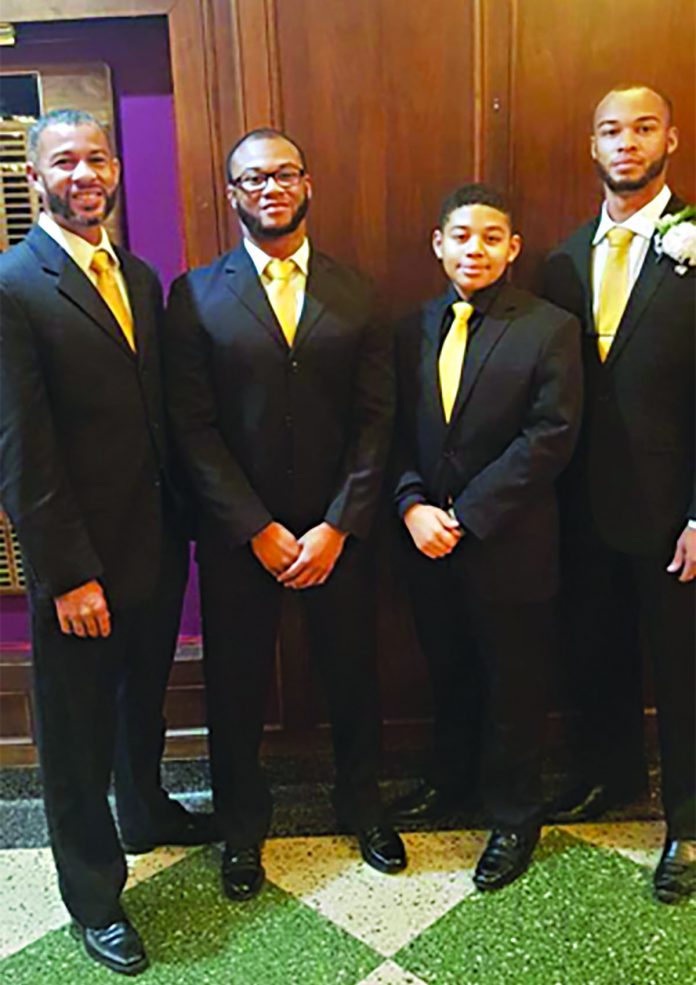By Angie H. Crutchley —
The death of George Floyd has sparked outrage across the United States and abroad. All four former officers have now been charged in his death. Discussions, arguments, and many threats were on social media this week. Local Facebook pages continue to be a polarized outlet. Mob mentality may bring views to light that have remained hidden. Untruths spew from the keyboards and before long, chaos ensues. While many are quick to post defensively, some care to listen. These four stories from Shore natives are for them.
Matthew Cornish, of Cheriton, has three sons, Matthew, Jaliel, and Malik. One is a teenager and two are in their early twenties. Cornish and his family run a funeral home in lower Northampton County. On social media, he shares funny stories about putting his sons to work throughout the year. Summers can be particularly sweltering while pouring burial vaults, but he wants to instill a strong work ethic in his children. He loves them and hopes he can protect them.
One of the ways he hopes to protect his sons is by giving them “the talk.” There are unwritten rules that many African American men are taught by family members as they approach driving age. These rules are how to survive a traffic stop.
Cornish points out that he has never had any trouble with law enforcement on the Shore. He has nothing but compliments for Sheriff David Doughty, who he says may be the most visible sheriff he’s ever seen in the community.
“I’ve always been comfortable on the Shore,” said Cornish. “We all know each other and I think respect each other.”
But a different experience was had on the other side of the bridge about a year ago. Cornish had finished a funeral and had gone to Virginia Beach to get payment and was on his way to the bank. Once he hit Independence Boulevard, in his Cadillac, he noticed a Silver Honda Accord following him. Within minutes a Virginia Beach police vehicle had pulled him over. The Accord and a burgundy minivan, both unmarked police vehicles, pulled behind the marked car. They ran his license and wanted to know where he was going. He asked why they pulled him over and the answer was failure to signal. The “failure to signal” led the three officers to ask to search his vehicle. The manila envelope with the payment for the funeral was on the front seat. Then the dog came. The drug-sniffing dog searched around the vehicle as Cornish leaned against the hood of the police cruiser. Next came the stripping of the vehicle in an extended search. Nothing was found and the officers bid him a good day and left without issuing a ticket. What prompted the search of a black man driving a Cadillac with cash leads to questions of profiling.
“I sat by the side of the road for over an hour as the officers searched my car. It was demeaning and embarassing. People were passing,” he said. “After all of that they didn’t even give me a ticket. You know what? I would have felt better if they had given me a ticket.”
He hoped his sons wouldn’t have to experience that, but experience and history have proven otherwise.
“I tell my sons to never give anyone a reason at all to pull you over: obey every speed limit, buckle your seatbelt, make sure every signal light works.
If they do get pulled, I encourage them not to provoke an officer. Even if the officer says stuff to them, take it. All that matters at that point is that they make it home. We’ll deal with the consequences later. I want my children alive,” said Cornish.
His son, Malik, graduated from Virginia Tech last year. Malik went to Broadwater Academy and eventually graduated from Northampton High School, where his father graduated in 1996. The travel to Blacksburg, Va., leads through some beautiful places, but also through places where there was a sense of unease and unwelcomeness.
“He knew not to stop in those places,” said Cornish.
Cornish’s parents were both teachers and they offered many strong lessons for their kids.
“My dad had a talk with me at a young age. He said, ‘Always keep it cordial, be cooperative. If there’s trouble, that’s what the court system is for.’”
He wants them to know that the “storm is repeating itself because it was never resolved in the ’50s and ’60s,” and “that is why all of these protests are important. We may never see the end of racism in our lifetime, but we can take steps.”
He has hope for his kids. They are three educated black men.
He said, “We just hope and pray that the values we instill are big enough to make a difference.”
********************
Army veteran Ernest H. Washington Jr., of Exmore, has ongoing discussions with friends about what to do when encountering police in a traffic stop. His son, Ernest Washington III, isn’t of driving age yet, but he plans to instill his knowledge and experience to try and reduce chances of harm to his son. He hopes what happened to him in Killeen, Texas, doesn’t happen to his son.
“I’ve had an experience with racial profiling. It was 2004 and I was in at Fort Hood. I just had my son, and I was not prepared for a baby so two of my sisters caught the bus from the Eastern Shore to Killeen to help me out. The day of their arrival, I left home about an hour early to get to the bus station because I was new to the area and didn’t know exactly where it was. When I finally located the bus station, I circled the block four or five times to find a parking space. Once I found a parking space, I pulled over and I stepped out of my vehicle to get a better view of the buses unloading. I was pacing back and forth while smoking a cigar. After about 20 minutes or so, two officers approached me. One was a large Asian officer, and one was a shorter Caucasian officer. The Caucasian officer approached me from the side and he began to talk to me. He asked me my name and what I was doing hanging out on the sidewalk. I begin to explain to him I was waiting on my sisters to get off the bus. I may have gotten out two words and I hear the short officer say loudly, ‘He’s got the crack in his mouth, Jim.’ The next thing I know, the white officer has me in a full nelson and off my feet. The Asian officer then proceeded to jam four fingers into my mouth searching around for crack. After they didn’t find anything, the Asian officer then asked me why a soldier would be hanging around in a drug area. He didn’t let me explain fully that I was waiting on the bus and I didn’t know the area I was in too well.
“I was distraught to say the least, my feelings were crushed and I lost all faith in the justice system. I never thought something like that would happen to me especially while serving my country. I thought at that instance, I can’t die for these people. They don’t love me. The scars from an incident like that, trust me, they last a lifetime,” said Washington.
His experiences on the Shore have been more positive. He hasn’t had many experiences with police locally. Many he knows or went to school with. But, he still acknowledges that for some the “good ol’ boy system” remains in play. Washington wants to give his son tools for when the day comes where he might get pulled over by an officer.
“I like to keep my hands on the wheel, and my license and registration over my visor and I try not to move too much. One of my friends will have his license and registration in his hand and out the window upon approach, and he’ll remain that way until released. One thing we all have in common is the fear we feel when those blue lights come on. When you don’t know who’s really behind that badge. It’s very scary thinking that there is a greater chance than not that this officer has a prejudice against you. And you begin to think about your family and your life,” said Washington.
Racism will remain a topic of discussion as long as it is prevelant in society. While discussions aren’t a means to an end, it is a step in the right direction.
Washington said, “Not one Caucasian alive is responsible for slavery. But it is your responsibility to recognize the stolen economic base that you partake in daily, the privilege that some blatantly choose to remain blind to. … The slave owners and the masters nowadays come in the form of politicians and the overseers, they wear robes (judges) and uniforms and they are school teachers. But I am optimistic. I truly believe that there are good people, more good people than bad.”
********************
Larry Jay Giddens Jr., formerly of Painter and now of Virginia Beach, has had an amazing career as an opera singer and as a graduate administrative assistant at Old Dominion University F. Ludwig Diehn School of Music and is currently working on his masters degree in music education.
His oldest son just turned 13 in February, and although he hasn’t had “the talk” yet, he has discussed “being a biracial kid in America and how his road of being a black man will be a long one that he’ll have to navigate and endure.”
When asked if he had received the talk, he said, “I lived the talk. Growing up with a father that was in law enforcement the majority of your life, the talk was what you lived. Conversations about respect and making good choices were always present in my home. I’m not saying that I’ve always made the right choices, but I’ve tried to treat everyone I’ve encountered with the respect that I would want until they no longer want or deserve that respect.”
Giddens has always had high expectations of how law enforcement should act because of family and friends that wear the badge.
Giddens was profiled in his first year in college. He recalled the event, “I was profiled … in Northampton County a little past Cape Charles by a state trooper as I was heading back to Old Dominion University. I was pulled over for not passing someone quickly enough. I didn’t really know that was a thing but one of the perks to being the junior of the then chief of police makes a conversation go a lot more smoothly than some of the things we’re seeing these days. Until he read my name, he wasn’t prepared to be a good person.”
Giddens acknowledges that there are differences in law enforcement officers, as is with everyone else. “Being a cop doesn’t carry the power to make you change who you are positively or negatively,” he said.
He thinks the heart of truth in people lies somewhere at the dinner table. “I think people understand more than they care to let on. We are all products of things before us, good and bad, and for some reason we all chose to hide what was talked about at the dinner tables because that’s where the real stuff lives. That’s where those casual racist and stereotypical things incubate. Even with that, my experiences are my experiences and I can’t expect anyone that isn’t 5’ll” and 300 pounds with brown skin and a furled brow to understand the same as I do. I experience this world in so many different ways and what I’ve found that works best is choosing what to pour into my household, my family, and children is my contribution to this world,” said Giddens.
He has hope for his children, even as he knows that not everyone in this world will give them the benefit of the doubt. But he will continue to do everything he can to help them achieve whatever their young minds can conceive.
“What I do know is that I will provide them with every opportunity within my power for them to succeed and be able to discern situations and people as they encounter them.Those are the tools and that is the hope,” said Giddens.
********************
Vikki Martin, currently residing in Waldorf, Md., but born and raised in Northampton County, loves and adores her 10-year-old son. She began discussing with him at a young age “about how his behavior, as innocent as it may be in nature, may cause others in positions of power, to interpret as bad, problematic, or threatening.”
Martin said, “As he gets older, the conversation becomes more direct and bold. Unfortunately, a lot of his innocence and beautiful naivety that most children are allowed to have, our black males are robbed of. I first had to OVERSTAND that I am raising a man, not a child and what responsibility that brings with it.
The goal has always been to get home no matter what. I can and will fight to my death over his mistreatment or harassment, but I need him to be alive. With the most recent murder of George Floyd, I am troubled with what to tell him now, because as shown, being compliant may also result in death.”
Every black male that she knows, including her 20-year-old nephew, has been profiled at some point in his life. An understandable fear occurs when the lights turn blue behind behind her while driving. She wants to point out that not every experience is negative with law enforcement. She has had some great experiences with LEOs.
“I allowed my son, who was 8 at the time, to ride in the front seat. I was at a stop light with a police officer to my left, and I waved good morning. He smiled, the light turned green and he pulled off after me, then behind me, then he hits his lights and quick siren. Terrified, I calmly told my son, ‘stay calm and don’t move. Do not grab anything and let Mommy handle this …’ When approached, I opened my window and while terrified, I said, ‘All I did was wave at you, I’m sorry.’ He smiled and asked me to relax and he wanted to express concern for my son’s size and him being in the front seat. … He asked me to slow down and keep him in a booster, in the back seat, for a little bit longer for safety. He let me go with a warning and a high five to my son. This was a white male officer. This experience de-escalated my son’s terror. I cried afterwards … hard. When my son asked why I was crying, I explained that he did his job, legally, appropriately with care and concern for a child and his mother.
The problem is not police officers. The problem is racists who join the force and use authority and power to amplify their personal goals and satisfy their personal beliefs,” Martin said.
********************
Posts on social media sites this week are a strong indication of our lack of listening skills. There have been “What if it were a white man? Would everyone be so outraged?” posts and threats of arson to local businesses. As sides were drawn, anger was prevalent. But there was another side of the conversation. Those were the ones who talked and who listened to one another. Those that trusted sharing personal experiences, good and bad and those that lie somewhere in the grey cracks – those were the ones that started making progress. Bravery may be best shown not by faceless Facebook rants but by listening and learning. For the ones who had conversations, for the ones who listened, a small glimpse of the sun can be seen and the lyrics of a Sam Cooke song can be heard, “It’s been a long, a long time coming but I know a change is gonna come.”




